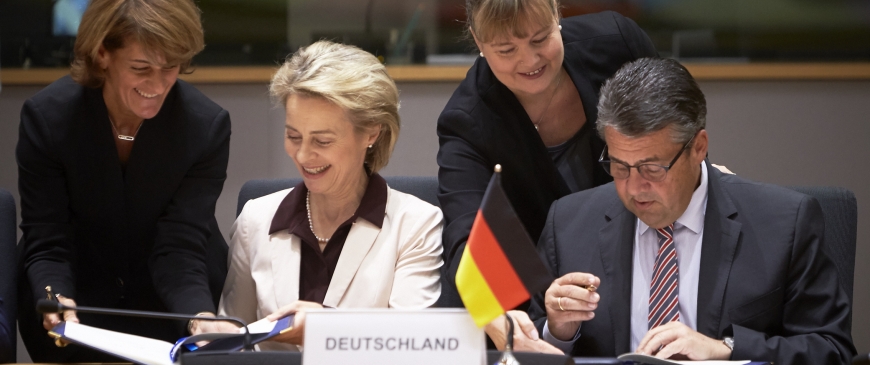
What defence policy for the next German government?
As they try to form a coalition government after last September’s inconclusive elections, Germany’s politicians are debating Germany's role in protecting Europe.
Germany still punches below its weight on defence and security matters, and its allies have a long list of demands when it comes to German defence engagement. How can these demands realistically be matched with the German narrative on its own national defence role as a “Friedensmacht” (power for peace)?
There are some signs of progress. German policy elites are increasingly aware that because of Germany’s economic and political power, both duty and self-interest require it to take on more responsibility. Recent Bundeswehr deployments in Mali and the German participation in the anti-IS coalition constitute limited non-combat missions, but they signify a sea change for Germany. Germany also leads a multinational battle group deployed in Lithuania as part of NATO’s deterrence and defence posture. And the German-led NATO framework nation structure, to which 19 other NATO nations have already signed up, holds great potential to make European forces more interoperable and to generate a pool of forces that can be deployed in NATO’s neighbourhood. But these operations and initiatives can only succeed with sustained German political and financial investment.
First, defence spending. Under-investment in the armed forces has left Germany with major shortfalls in its capabilities. And while Berlin has committed to raising its defence spending to 2 per cent of GDP by 2024, this target has met considerable political resistance. This was particularly evident during last year’s election campaign, when the Social Democrats pushed back against the 2 per cent metric, dismissing the target as cow-towing to President Trump, and promoting spending for spending’s sake. But this argument does not hold: if Berlin aims to become less dependent on the United States and its security guarantee – an objective outlined by SPD Foreign Minister Sigmar Gabriel in a speech in December – more investment in defence is a requisite.
Nevertheless, the SPD has kept the 2 per cent target out of the coalition agreement with the CDU. Instead SPD Europe minister Michael Roth stated that “for every euro spent on defence, one euro should be spent on development aid”. Increasing Germany’s development spending, which has long fallen way short of the UN target of 0.7 per cent of GNI, is necessary. But linking development aid with defence investment won’t allow Berlin to circumvent the sensitive debate on hard defence spending forever.
Funding and developing defence capabilities is the first step; deploying military forces into conflict areas is the second. The US security umbrella has made it possible in the past for Berlin to avoid facing difficult questions on the use of force. Germans like to think of themselves as pacifists. But being a pacifist country is easy when security is guaranteed by someone else; and German pacifism has often served as camouflage for a reluctance to engage.
When, in spite of these political constraints, Berlin became a leading voice in European defence initiatives after 2014, a fear of a ‘Germanisation’ of European defence – a focus on institutions rather than military operations – came to shape the way Germany’s partners interacted with Berlin. French president Emmanuel Macron is committed to EU defence and the partnership with Germany, but also focused on the practical output: he wants Europeans to be able to deploy troops faster and more effectively and has called for a European Intervention Initiative outside EU structures.
To become a truly reliable ally, German political elites must make a continued effort to explain the defence dimension of foreign policy to the German public. According to a 2017 Pew Research Centre survey, while 67 per cent of Germans hold a positive opinion of NATO, with support up twelve points from 2015, 53 per cent of Germans do not believe that Germany should honour NATO’s Article 5 and use military force to defend an ally if it is attacked by Russia. At the same time, 65 per cent are confident that the United States would come to their aid in any conflict with Russia. And while 71 per cent consider ensuring the security of Germany and its allies the most important task for German involvement in international affairs, only 32 per cent support an increase in defence spending.
These positions are unsustainable. It is up to politicians to lead the public, while at the same time think tanks and the broader expert community must continue to foster strategic debate with government officials – that debate must include uncomfortable issues, like German arms exports, and its role in European nuclear deterrence. That conversation has to begin in the next four years. In the long-term there is hope, if a new generation of creative, Europe-minded politicians from all parties can take over the reins from the old guard.
Sophia Besch is a research fellow at the Centre for European Reform.
